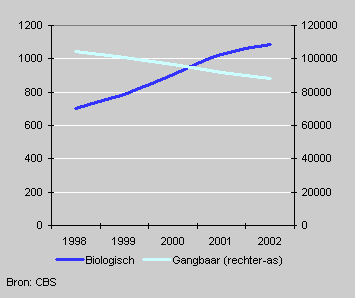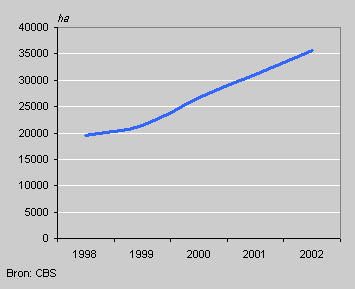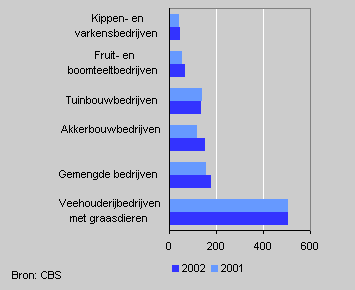Growth in organic farming slowing down

The increase in the number of organic farms in the Netherlands has slowed down for the second year in a row. In 2000 the number rose by more than 15 percent, in 2001 by 13 percent. In 2002 the number of these farms rose by only 6 percent, to 1,088. This is the equivalent of 1.2 percent of farms in the Netherlands.
Number of organic farms

Fewer switchovers
Fewer farms switched from conventional to organic farming methods in 2002. The number of farms ‘in transition’ was 7 percent down on 2001.
Larger area
In 2002 the area of organically farmed land rose strongly, by 15 percent. This increase is similar to that in 2001. Organic farmland totalled more 35 thousand hectares, accounting for 1.8 percent of total farmland in the Netherlands.
Area of organic farmland

Developments per sector
Organic methods are becoming more popular in arable farming in particular. The number of organic arable farms rose by nearly a third to 155.
Farms with grazing livestock account for nearly half of total organic farms. These are mostly dairy farms and the number has remained about the same. The number of horticultural businesses using organic methods has also remained about the same. The number of organic fruit growers and tree nurseries rose by 21 percent.
Organic farming by sector

Organic livestock increasing
The number of organically reared chickens doubled in 2002 compared with one year previously, to just over 600 thousand. Both the number of broilers and laying hens doubled. Organically reared cattle rose by 15 percent to nearly 42 thousand heads. Organic pig farmers increased their livestock by more than a third to nearly 29 thousand, and the number of organic milking goats rose by a quarter to just over 12 thousand.
Largest increase in Gelderland
The largest relative increase in the area of organic farmland was in the province of Gelderland, where it expanded by 47 percent. Other relatively large increases were in the provinces of North Brabant, Zeeland and South Holland. In the province of Groningen, on the other hand, the area of organically farmed land decreased by 12 percent.
Flevoland still has the largest area of organic farmland.
Johan Fraeijhoven